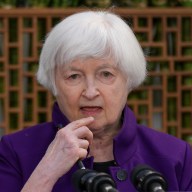 Harvard University officials are releasing more information about searches of faculty email accounts. (Photo: Amanda Art/Metro)
Harvard University officials are releasing more information about searches of faculty email accounts. (Photo: Amanda Art/Metro)
Harvard University officials say secret searches of faculty email accounts were more extensive than they initially reported.
Dean of Harvard College Evelynn M. Hammonds told a faculty meeting on Tuesday that she authorized a resident dean’s faculty and administrative email accounts to be searched for a second time, looking for evidence of a media leak. The unnamed dean allegedly forwarded an email about a widespread cheating scandal to two reporters from the Crimson, Harvard’s student newspaper.
That contradicts a statement Hammonds and Harvard President Drew Faust released last month, which characterized the probe as a “very narrow, careful, and precise subject-line search” limited to the administrative email accounts of 16 resident deans. Most of the deans did not receive advanced notice about the initial search, which took place last fall.
“I regret deeply the poor notification of these searches,” Hammonds said Tuesday, according to the Boston Globe, which obtained a copy of Hammonds’ remarks. “Let me be clear: No e-mails were opened, and no content was searched.”
Resident deans are both administrators and faculty, and have both types of email accounts. The Crimson reports that the additional searches appear to violate the Faculty of Arts and Sciences email privacy policy that governs faculty email accounts. That policy requires searches be approved by the FAS Dean and the Office of the General Counsel.
FAS Dean Michael Smith says he didn’t find out about the email searches until last month.
“Although I consulted with legal counsel, I did not inform Dean Smith about the two additional queries. This was a mistake,” Hammonds said. “I also regret the inaccuracies in our March 11 communication resulting from my failure to recollect the additional searches at the time of that communication.”
Faust said a non-Harvard attorney is investigating the extent of the searches, and that a task force is being formed to revamp the university’s email privacy policies.
It may take more than new regulations to satisfy some faculty members.
“It seems to me that trust has to be based on something,” classics professor and Faculty Council member Richard F. Thomas said at the meeting. “The request that you make that we have trust suggests there aren’t consequences from this past case that go beyond saying simply, ‘Let’s all talk and get along together.'”
Follow Metro Boston on Twitter: @MetroBos











